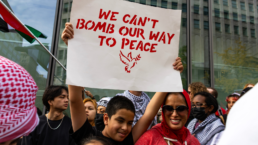For any peace movement, figuring out how to approach Trump will be like shadowboxing—trying to imagine what position he’s likely to take next.
By William Hartung, LA Progressive
When the election results came in on November 4th, I felt a pain in the pit of my stomach, similar to what I experienced when Ronald Reagan rode to power in 1980, or with George W. Bush’s tainted victory over Al Gore in 2000. After some grieving, the first question that came to my mind was: What will a Trump presidency mean for the movements for peace and social justice? I offer what follows as just one person’s view, knowing that a genuine strategy for coping in this new era will have to be a distinctly collective process.
As a start, history offers some inspiration. On issues of war and peace, the trajectory of the Reagan administration suggests how surprising hope can prove to be. The man who joked that “we begin bombing [Russia] in five minutes,” and hired a Pentagon official who told journalist Robert Scheer that America would survive a nuclear war if it had “enough shovels” to build makeshift shelters, ended up claiming that “a nuclear war cannot be won and must never be fought.” He even came tantalizingly close to an agreement with Soviet leader Mikhail Gorbachev to abolish nuclear weapons altogether.

To his credit, Reagan developed a visceral opposition to such weaponry, while his wife, Nancy, urged him to reduce nuclear weapons as a way to burnish his legacy. A Washington Post account of her role noted that “[s]he made no secret of her dream that a man once branded as a cowboy and a jingoist might even win the Nobel Peace Prize.” Such personal factors did come into play, but the primary driver of Reagan’s change of heart was the same thing that undergirds so many significant changes in public policy—dedicated organizing and public pressure.
Reagan’s presidency coincided with the rise of the largest, most mainstream anti-nuclear movement in American history, the nuclear freeze campaign.
Along the way, in June 1982, one million people rallied for disarmament in New York’s Central Park. And that movement had an impact. As Reagan National Security Advisor Robert MacFarlane pointed out at the time, “We took it [the freeze campaign] as a serious movement that could undermine congressional support for the [nuclear] modernization program, and potentially… a serious partisan political threat that could affect the election in `84.”
Recent Posts
“Arrest Now, Ask Questions Later”: Why Did L.A. ICE Agents Arrest and Jail U.S. Citizen Andrea Velez?
July 3, 2025
Take Action Now “They didn’t have vests that said ICE or anything. Their cars didn’t have license plates. … Just because of the color of our…
Trump’s Big, Beautiful Bill Is Naked Class War
July 3, 2025
Take Action Now Trump’s “Big, Beautiful Bill” trades tax cuts on millionaires for the dissolution of society.By Hamilton Nolan, In These Times…
Mayor Mamdani’s First Day, A Zero Hour Conversation With Richard Wolff
July 2, 2025
Take Action Now If elected, what would Mayor Mamdani do on his first day in City Hall? How would a democratic socialist govern as a big-city mayor?……
The U.S. Is Funding A Bloodbath At Gaza Aid Centers
July 2, 2025
Take Action Now The admin just gave $30M to GHF, the organization at the center of charges that Israel is weaponizing assistance and shooting at…




